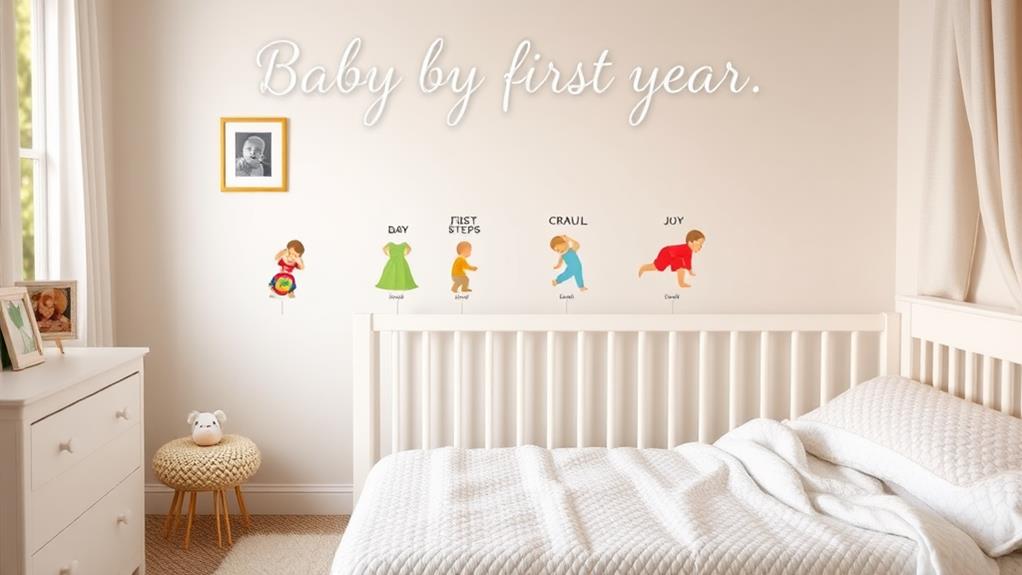In your baby's first year, you'll encounter 16 key milestones that are crucial for their development. Each achievement, from that first smile to taking those tentative steps, marks significant growth in motor skills, communication, and emotional connections. As you observe these moments, you'll likely find yourself wondering how they shape your child's future. What do these milestones really mean for their overall development? Understanding the nuances behind each can provide valuable insights into your baby's journey. Let's explore these milestones and their impact on your little one's growth.
First Smile
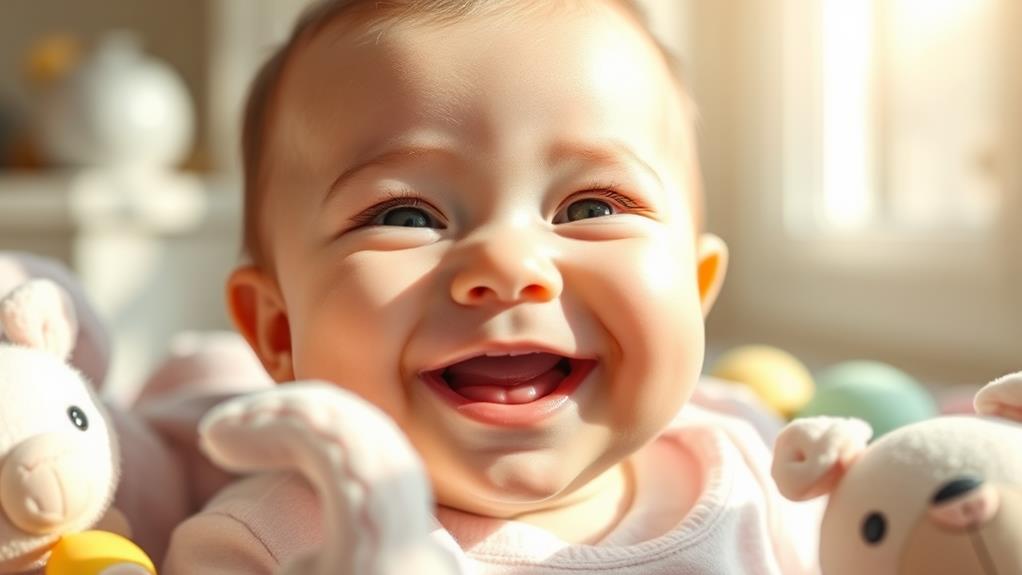
Your baby's first smile is a magical moment that marks a significant milestone in their development. This enchanting expression usually happens between six to twelve weeks of age, and it's often a response to your voice or face. When you see that smile, it's like a light bulb turning on in their little world. They're starting to connect with you, and that bond is incredibly special.
A smile isn't just adorable; it's a crucial way your baby communicates. At first, they may smile reflexively, but as they grow, those smiles become more intentional. They're learning to express joy and happiness, which helps them interact with you and their environment. When you respond to their smiles, you're encouraging this important social development.
To encourage those smiles, spend time holding, talking, and playing with your baby. Make funny faces or noises, and watch as they light up with delight. Each smile you share strengthens your emotional connection and helps your baby develop their social skills.
Tummy Time Triumph
After those heartwarming first smiles, you'll want to introduce tummy time, another vital aspect of your baby's development.
Tummy time helps strengthen your baby's neck, shoulders, and back, preparing them for future milestones like sitting up and crawling. It's essential to start this practice early, even when your little one is just a few weeks old.
You can begin with short sessions, perhaps just a few minutes a couple of times a day. As your baby gets used to it, gradually increase the time.
Make it fun by laying down next to them, using colorful toys, or engaging them with your voice. This interaction not only keeps them entertained but also fosters a bond between you.
Rolling Over
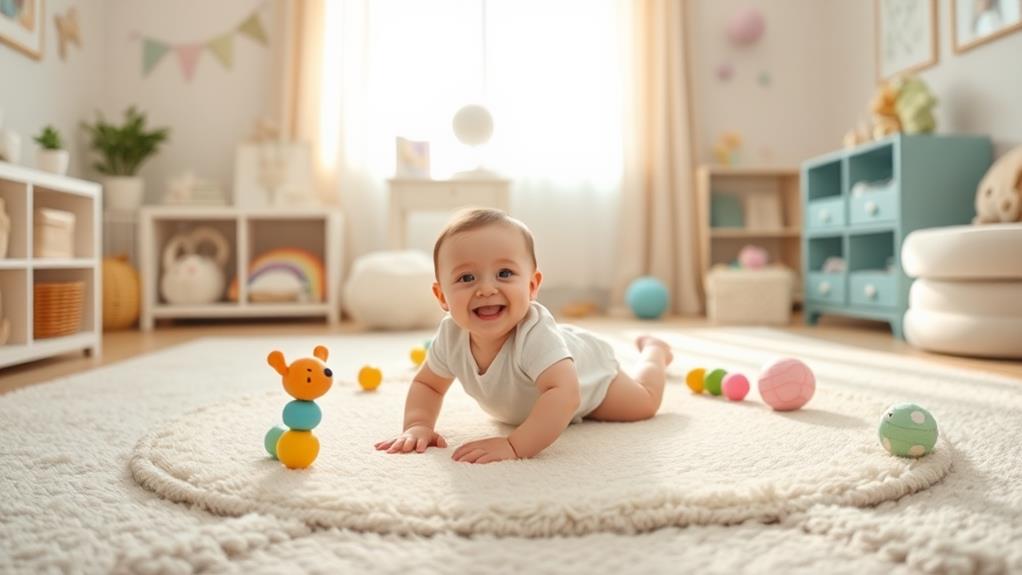
As your baby hits around the 4 to 6-month mark, they're likely ready to roll over, a significant milestone that showcases their growing strength and coordination. At this stage, your little one is building muscles and improving their motor skills. You might notice them pushing up on their arms during tummy time, which is a great sign they're gearing up for this new feat.
To encourage rolling over, create a safe and engaging space for your baby to practice. Place them on their tummy with some colorful toys nearby, which will motivate them to reach and twist. You can also gently guide them by helping them shift their weight from one side to the other.
When they finally roll, it's a moment of joy for both of you! Your baby may surprise you by rolling unexpectedly, so always keep a watchful eye.
This skill not only promotes physical development but also enhances their curiosity about the world around them. Enjoy this exciting time as your baby rolls into new adventures, and remember to celebrate each little success along the way!
Sitting Up
Around the 6 to 8-month mark, many babies begin to master the skill of sitting up independently, a crucial milestone that reflects their increasing balance and core strength.
As your little one develops this skill, you'll notice they'll start to sit with less support, using their hands for balance. It's an exciting time, as sitting up opens up a whole new world for exploration.
Encourage this new ability by providing a safe, soft space for practice. You can sit with your baby, offering toys just out of reach to motivate them to reach and balance.
As they gain confidence, they'll likely try to sit for longer periods without toppling over.
It's important to remember that each baby is unique, so don't worry if your child isn't sitting up at the same pace as others. Some may take a bit longer to get comfortable in this position.
Celebrate their progress and keep practicing together! Soon, you'll see them transitioning from wobbly moments to sitting confidently, ready to take on the next adventures that come their way.
Enjoy these moments; they're foundational steps in your baby's development!
Crawling
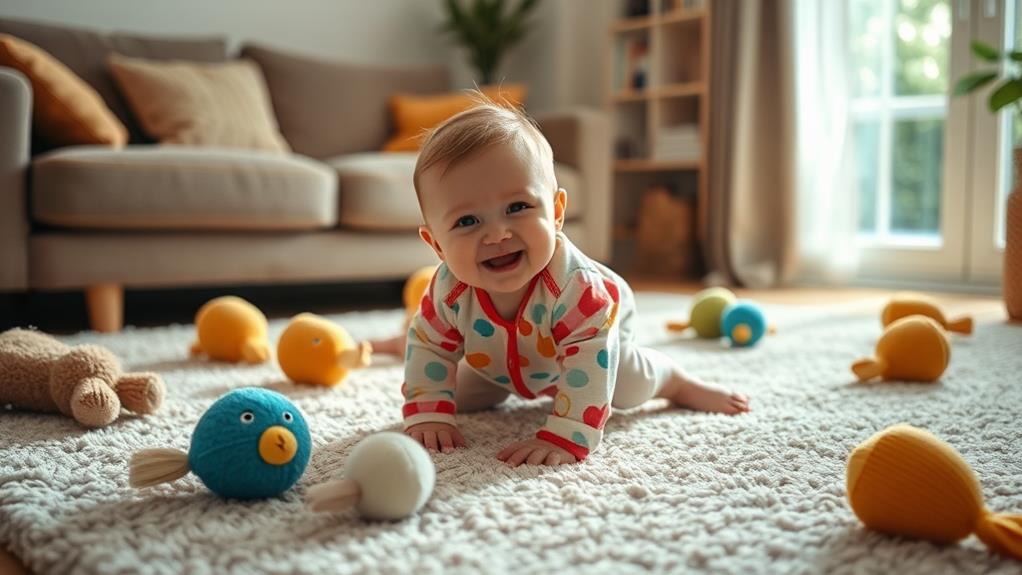
Once your baby has mastered sitting up, they're likely to become eager to explore their surroundings, and crawling is the next exciting milestone on that journey. Typically occurring between six to ten months, crawling marks a significant leap in your baby's independence.
You'll notice them pushing up on their hands and knees, then moving forward in a wobbly yet determined fashion. Crawling not only strengthens their muscles but also enhances coordination and balance.
It's amazing to watch as they discover new toys, reach for familiar faces, and investigate every nook and cranny of your home. As they crawl, your baby learns to navigate their environment, which lays the groundwork for future skills like walking.
Encourage this newfound mobility by creating a safe space for exploration. Remove sharp edges, secure heavy furniture, and keep small objects out of reach.
You can also motivate them by placing toys just out of reach, making it enticing for them to crawl towards those treasures.
First Words
By the time your baby reaches around twelve months, you may hear those cherished first words that mark a major communication milestone. This moment isn't just exciting; it's a sign that your little one is starting to connect with the world around them.
Typically, the first words are simple and often related to their immediate environment, like "mama" or "dada." These words often come after months of babbling and experimenting with sounds.
You'll notice your baby might mimic sounds or gestures you make, honing their ability to communicate. Encouraging this development is vital, so engage with your baby by repeating words and using them in context.
For instance, when you see a pet, say its name and describe what it's doing. This helps build your baby's vocabulary.
Social Interactions
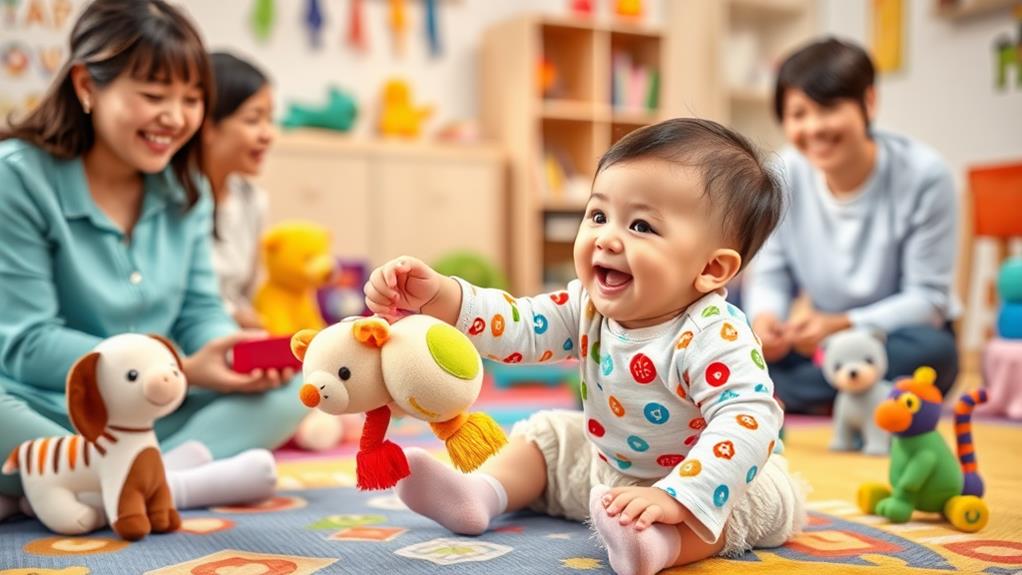
Your baby's social interactions begin to blossom during the first year, laying the foundation for future relationships. Around three months, you'll notice your little one responding to your smiles and vocalizations. This is when they're starting to engage with the world around them.
By six months, they'll likely giggle and babble, showing excitement when interacting with familiar faces. As your baby approaches their first birthday, they'll start to recognize emotions in others. You might even catch them imitating your expressions, which is a fun way they learn about social cues. They begin to form attachments, showing preferences for certain caregivers or toys.
Encouraging these interactions is crucial. Playtime becomes an essential tool; it's through play that your baby learns to share, take turns, and express feelings. Simple games like peek-a-boo or pat-a-cake promote bonding and social skills.
As you engage with your baby during this time, remember that every smile, coo, and giggle is a stepping stone toward developing social skills that will last a lifetime. Enjoy these moments, as they're vital for your baby's emotional and social growth!
Hand-Eye Coordination
As your baby's social interactions flourish, you'll also notice significant developments in their hand-eye coordination. This skill is crucial for many everyday tasks, and it starts to emerge around 3 to 4 months. You might see your little one reaching for toys or following objects with their eyes, which is a sign that they're becoming more aware of their surroundings.
By 6 to 9 months, your baby's hand-eye coordination will improve even further. They'll start grasping objects and transferring them from one hand to the other. You can encourage this development by offering colorful toys or soft balls for them to explore.
Playtime is essential, as it helps strengthen those necessary muscles and coordination skills.
As they approach their first birthday, you'll notice them becoming more precise with their movements. Your baby might be able to pick up smaller items, like pieces of cereal, using their thumb and forefinger, showing that their dexterity is on the rise.
Celebrate these milestones by engaging in playful activities that involve reaching, grasping, and stacking, as they'll enjoy it and benefit from the practice. Watching your baby grow in this way is truly exciting!
Standing Up
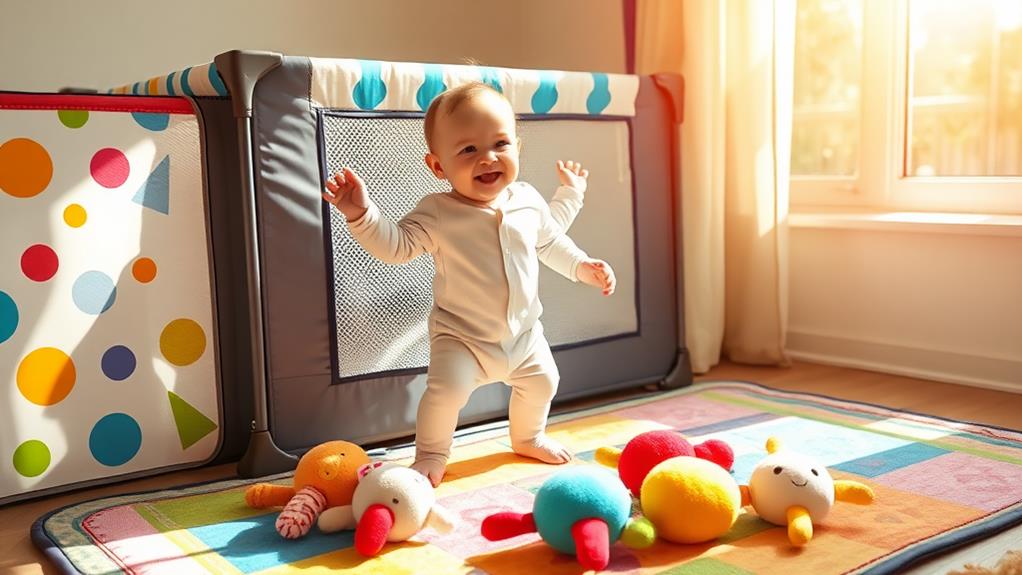
Around 9 to 12 months, standing up becomes an exciting milestone in your baby's development. At this stage, you'll notice your little one pulling themselves up using furniture or your legs for support. This newfound skill is crucial, as it helps strengthen their legs and improve balance. You might find them practicing this skill frequently, often with a big smile on their face!
Encourage this milestone by creating a safe environment. Make sure furniture is stable and free of sharp edges, so your baby can explore without worry. You can also use soft rugs or play mats to cushion any falls.
When they pull up to a stand, offer plenty of praise and maybe even some fun toys to keep them motivated.
As your baby gains confidence, they may start to experiment with standing without support for brief moments. This is all part of their learning process.
First Steps
After mastering the art of standing, many babies are eager to take their first steps. This exciting milestone usually happens between 9 and 15 months, but every child is unique, so don't stress if your little one takes a bit longer. You might notice your baby pulling up to stand and then cautiously letting go, testing their balance before they dive into this new adventure.
Encourage your child by providing a safe space to explore. Create a soft area with cushions or a play mat to help them feel secure as they practice. You can also hold their hands while they walk or place their favorite toy just out of reach to motivate them to move forward.
When they finally take those wobbly steps, celebrate the accomplishment! Your enthusiasm will boost their confidence and make them want to walk even more.
Remember, falls are a natural part of the learning process, so keep a close eye and be ready to offer support. With patience and encouragement, your baby will soon be cruising around the house, exploring their world with newfound freedom.
Enjoy this beautiful journey as your little one takes their first steps towards independence!
Object Permanence
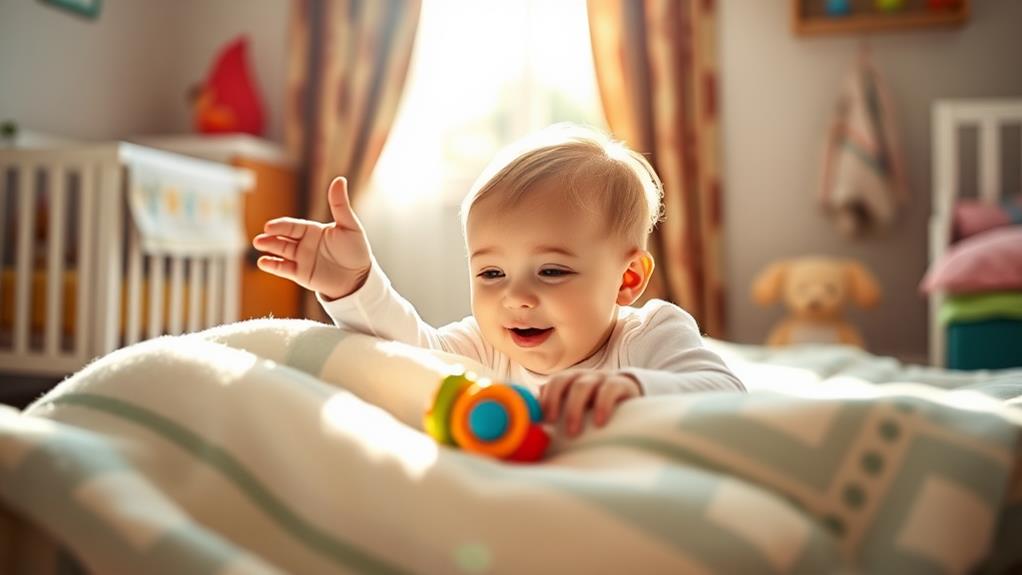
During your baby's first year, one important cognitive milestone is the development of object permanence. This concept means that your little one starts to understand that objects continue to exist even when they can't see them. Around 4 to 7 months, you'll notice that your baby begins searching for toys or items that you've hidden from view. This is a big leap in their cognitive development!
As your baby grows, they'll become more aware of their surroundings and will start to track objects with their eyes. When you play peek-a-boo, for example, your baby may initially be confused when you cover your face, but as they grasp object permanence, they'll anticipate your reappearance. It's a delightful moment!
Encouraging this skill can be fun and simple. Try hiding a favorite toy under a blanket or behind a pillow. Watch how excited your baby gets when they find it!
This understanding not only helps with problem-solving but also lays the foundation for more complex thinking later on. So, celebrate these moments and enjoy watching your baby's world expand as they realize that things are still there, even when they can't see them!
Imitation Skills
As your baby masters object permanence, they'll also begin to develop imitation skills, which are vital for their learning and social interaction. Imitation is how your little one learns about the world around them. They'll watch you closely, trying to mimic your actions, gestures, and even sounds. This stage typically starts around six to nine months, but each baby develops at their own pace.
You'll notice your baby copying simple actions, like clapping hands or waving goodbye. These skills are essential for communication and social bonding. When your baby imitates you, it's more than just play; they're practicing important concepts that will help them connect with others later in life.
Encourage this behavior by being expressive and engaging. Make funny faces, sing songs, or play peek-a-boo, and watch as your baby eagerly tries to replicate what they see.
Responding to their attempts at imitation reinforces their learning. Celebrate their efforts with smiles and claps! This positive feedback boosts their confidence and encourages further exploration.
Fine Motor Skills
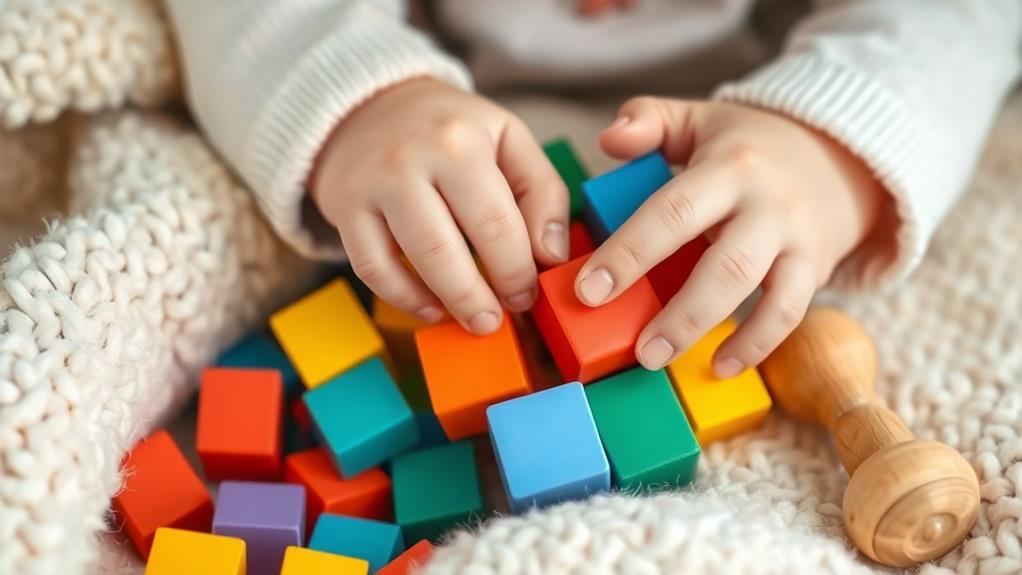
Fine motor skills are essential for your baby's development, enabling them to explore their environment more effectively. These skills involve the use of small muscles in the hands and fingers, allowing your little one to grasp, manipulate, and interact with objects around them.
In the first year, you'll notice significant progress in these skills, starting with simple movements like grasping a rattle. By around three months, your baby might begin to swipe at toys, and by six months, they'll likely be able to pass objects from one hand to the other.
As they approach their first birthday, you'll see even more refined movements, such as picking up small items with their thumb and forefinger. This pincer grasp is a key milestone, paving the way for more complex tasks, like self-feeding.
Encouraging fine motor skill development can be fun! You can provide toys that encourage grasping, stacking, and building. Simple activities like finger painting or playing with playdough can also help strengthen those small muscles.
Emotional Development
How does your baby's emotional development unfold in their first year? In the first few months, your little one shows basic emotions like joy and anger, often through crying or smiling. They're learning to express themselves, and your responses play a crucial role. When you smile back or comfort them, you help them feel secure.
Around three to six months, your baby begins to exhibit a wider range of emotions. They might laugh out loud or show signs of frustration when they can't reach a toy. It's fascinating to watch as they start to bond with you, recognizing familiar faces and feeling comfort in your presence.
By six to twelve months, your baby becomes more aware of social interactions. They might show anxiety when separated from you, which is perfectly normal. This stage is crucial for developing trust and attachment.
You'll notice them mirroring your emotions, which is a sign they're learning about feelings.
Throughout the first year, your support and affection nurture their emotional growth. By providing a loving environment, you're laying the foundation for your child's emotional well-being for years to come.
Language Comprehension
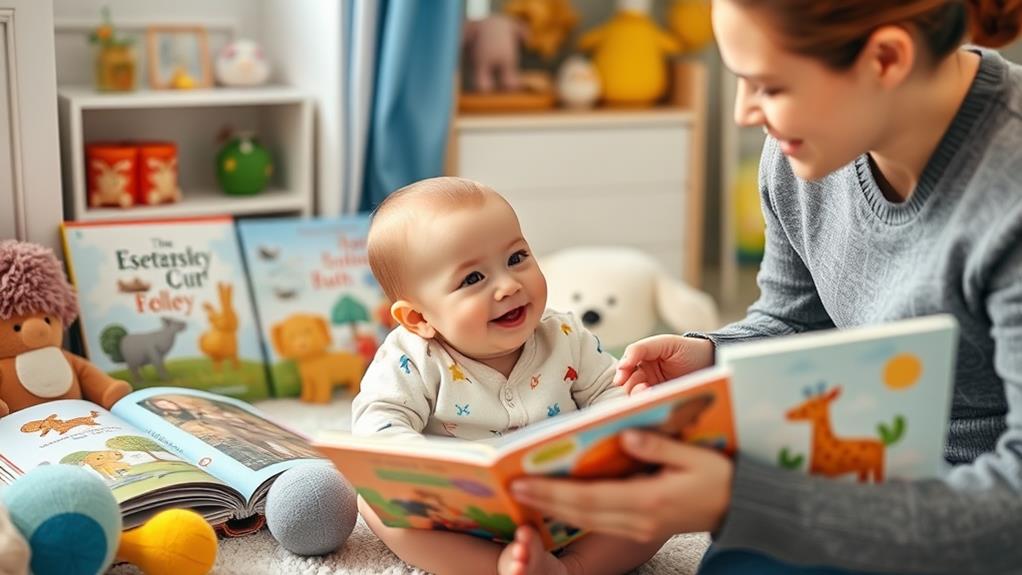
While your baby's emotional development flourishes, their language comprehension begins to take shape as well. From the moment they're born, your little one starts to recognize sounds, especially your voice. By around two months, they can respond to your tone, showing excitement or calmness based on how you speak. It's fascinating how quickly they pick up on the rhythm of language!
As your baby grows, they'll start to connect words with meanings. By six months, they might understand familiar words like "mama" or "bye-bye." You'll notice them reacting to these words with smiles or gestures, which is a huge milestone!
Around the nine-month mark, your baby may begin to follow simple commands like "come here" or "wave bye-bye."
Reading to your baby is a fantastic way to boost their language skills. The more you talk, sing, and read, the better they'll understand language. Engaging them with colorful books and pointing out objects helps reinforce their grasp of words.
Problem-Solving Abilities
Problem-solving abilities start to emerge as your baby explores the world around them. During the first year, you'll notice your little one experimenting with objects and figuring out how things work. For instance, when they shake a rattle, they're not just making noise; they're discovering cause and effect. This process lays the groundwork for critical thinking skills.
As your baby approaches six to nine months, they'll begin to tackle simple challenges, like reaching for a toy that's slightly out of reach. You might see them try different strategies, such as rolling over or crawling to get what they want. This exploration is vital for developing perseverance and adaptability.
By around ten to twelve months, your baby may surprise you with their cleverness. They might understand how to manipulate a shape sorter or find hidden objects. These skills are essential for cognitive development, as they learn to solve problems and navigate their environment.
Encourage this growth by providing safe, engaging toys that stimulate their curiosity.

